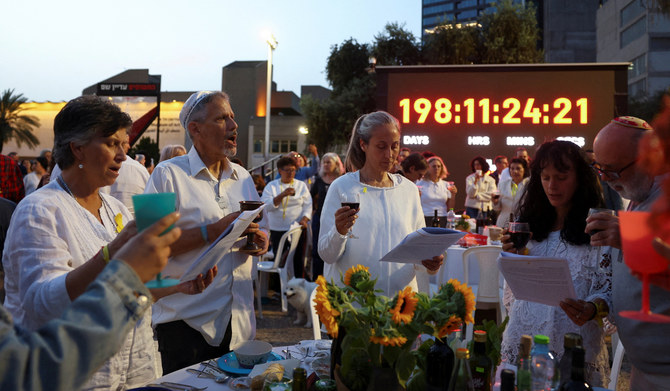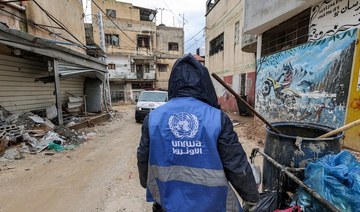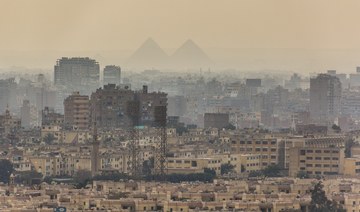JERUSALEM: Jewish people marked Monday the start of Passover, a celebration of freedom, and around many holiday tables in Israel chairs stood empty for hostages still held captive in Gaza.
The week-long Jewish festival, also known in Hebrew as the “holiday of freedom,” celebrates the Israelites’ liberation from Egyptian slavery, as told in the Bible.
Passover is traditionally observed with a seder: a holiday feast when families eat symbolic foods and read the Haggadah.
The more than millennium-old text recounts the Exodus and Jewish people’s ties to, and their yearning to return to, the Holy Land.
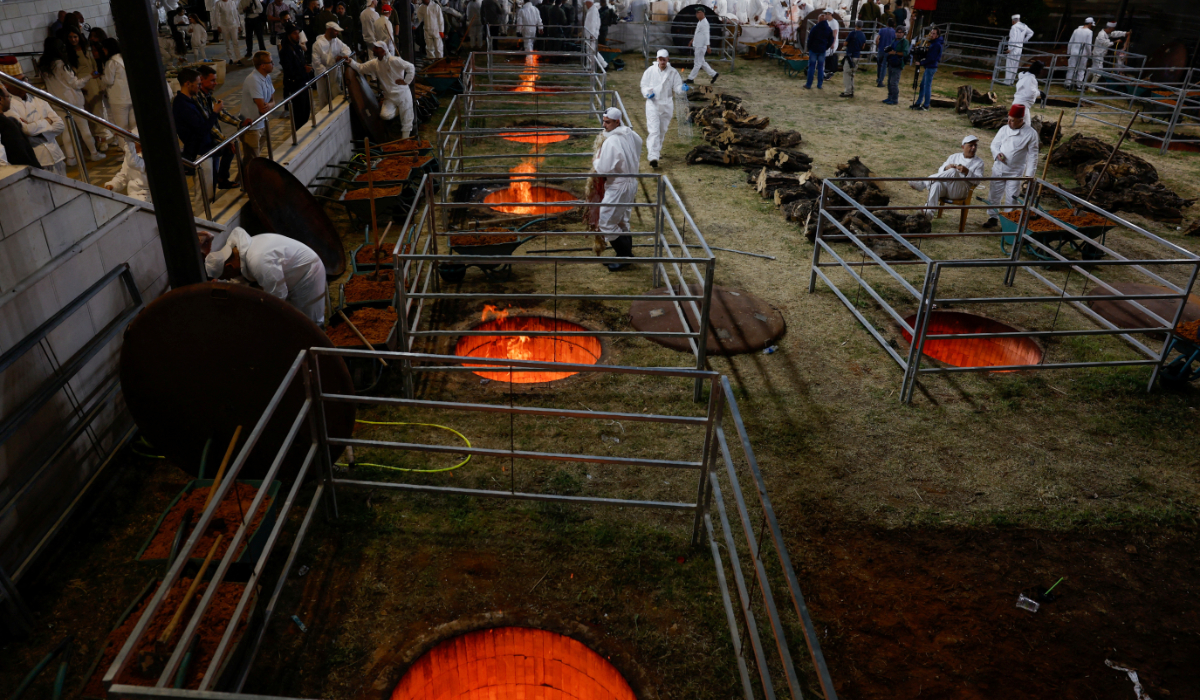
Members of the Samaritan sect take part in the traditional Passover sacrifice ceremony on Mount Gerizim near Nablus, in the Israeli-occupied West Bank, April 22, 2024. (REUTERS)
For many this year, Passover will be stained by absence and anguish; particularly the relatives of the hostages, grieving families and more than 120,000 Israelis displaced from their homes in the north and south of the country because of the war in the Gaza Strip.
“All of the symbolic things we do at the seder will take on a much more profound and deep meaning this year,” said Rachel Goldberg-Polin, whose son Hersh is one of the hostages.
“The bread of affliction, the bitter herbs, the saltwater that represents the tears of the Jewish people when they were in captivity, in slavery.”
For days, Israeli Jews have been making preparations for the holiday: fastidious house cleaning, burning leavened goods eschewed during Passover, and copious food shopping.
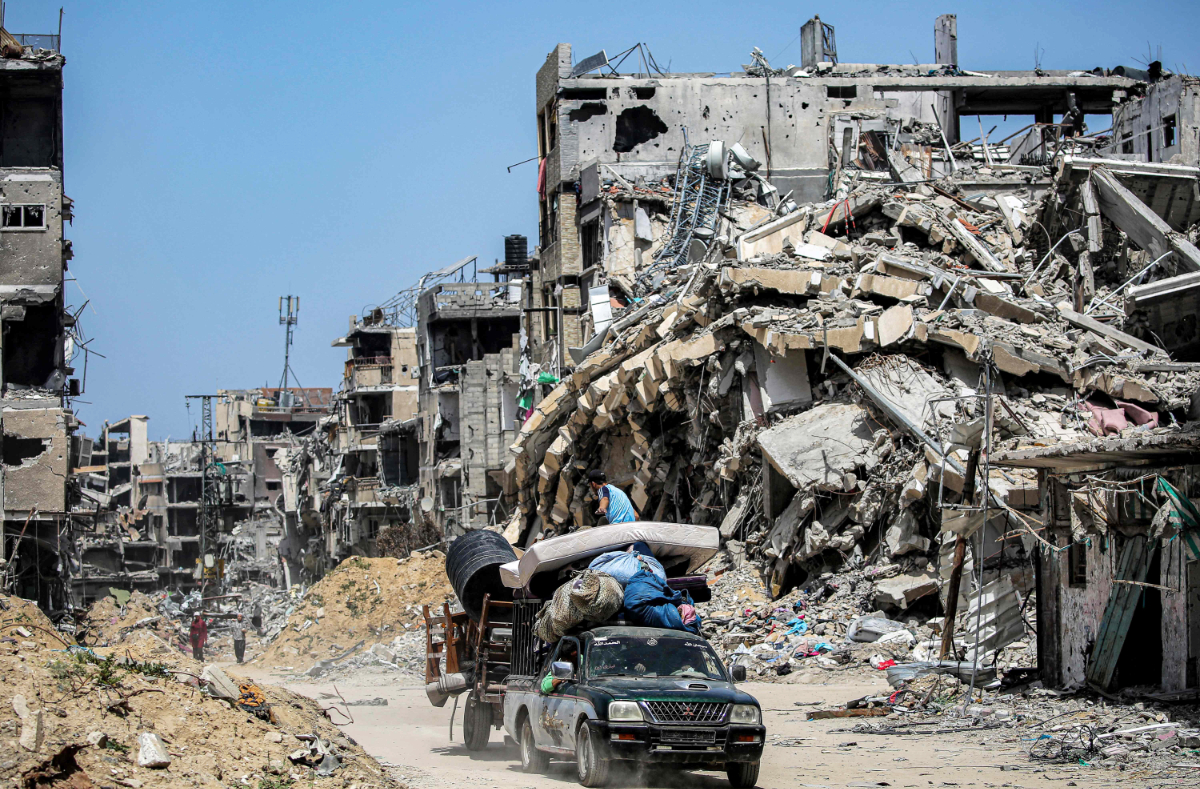
A pickup truck pulling a cart loaded with mattresses and furniture moves past destroyed buildings in Khan Yunis in the southern Gaza Strip on April 22, 2024 amid the ongoing conflict in the Palestinian territory between Israel and the militant group Hamas. (AFP)
But the holiday mood has been dampened by more than six months of war in Gaza, with many Israelis serving in the military away from home.
Above all, the continuing captivity of 129 hostages abducted by Palestinian militants on October 7 has cast a pall over Passover.
On that day, Gaza-based militants launched an unprecedented attack on southern Israel, resulting in the deaths of 1,170 people, Israelis and foreigners, according to an AFP tally based on official Israeli figures.
Militants also abducted some 250 people during the attack.
Israel’s retaliatory invasion of the Gaza Strip has killed 34,151 people, mostly women and children, according to the Hamas-run territory’s health ministry.
Neither military force nor indirect negotiations with Hamas have yet succeeded in bringing the remaining hostages home.
“Everything is deadlocked and nobody knows how to move forward, on our side and on the Hamas side,” said Gershon Baskin, an Israeli activist who has mediated between Israel and Hamas for more than a decade to free hostages in Gaza.
“We’re held hostage by our government and held hostage by Hamas,” he said. “There is no freedom this year.”
For many relatives of the captives, this Passover will not be joyous.
“How can we celebrate such a holiday while ... people are still without their freedom, still waiting to be liberated?” asked Mai Albini. His grandfather Chaim Peri was taken hostage on October 7.
Hundreds took their discontent to the street, burning a symbolic seder table in protest outside Prime Minister Benjamin Netanyahu’s house on Monday evening.
“He doesn’t want the hostages back because he doesn’t want the war to end or he’ll go to prison,” said protester Guy Ben Dror in the coastal town of Caesarea.
Tzohar, a rabbinic group, the Hostage and Missing Family Forum and President Isaac Herzog have all urged families to leave an empty chair at their seder table, with the picture of a hostage on it.
“There is great hardship” this Passover, said Tzohar’s head rabbi, David Stav.
“Even at the most traditional seder night, the practice is that we also mention that which is missing and difficult.”
The Hostage and Missing Family Forum published a special edition of the Haggadah that “integrates new hopes, and introduces inspiring messages of contemporary spirit.”
It contains contributions from hostages’ relatives, a former chief rabbi of Israel, and Rita, a prominent Iranian-Israeli singer.
It has sold more than 250,000 copies in Israel and abroad, said Itay Shenberger, who heads the Haggadah project.
“It’s basically all the stock we had,” he said. The proceeds go to the forum’s efforts to secure the hostages’ release.
Many families will mark Passover away from home, driven out by fighting between Israel and militant groups Hamas and Hezbollah that has turned northern and southern border communities into ghost towns.
Around 60,000 Israelis from the north and almost an equal number from southern Israel remain internally displaced, according to official figures.
Hotels still house more than 26,000 displaced, many of whom will hold seders there.
Kibbutz Beeri, one of the hardest hit communities in the October 7 attack, will hold a communal seder in the Tel Aviv plaza that has become the epicenter of the hostage protests.
Nisan Zeevi, an entrepreneur from Kfar Giladi kibbutz near the Lebanese border, said his family has been “uprooted from our homes” for more than half a year.
Political leaders have given them no hint as to when they might return, he said.
“We’re not celebrating Passover in a normal way,” Zeevi said. Like the biblical Israelites, he added, this year they will “wander in the desert.”




